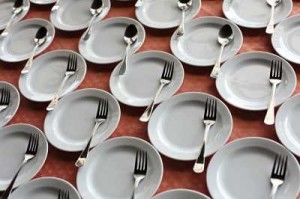You all have heard the old adage that 6 small meals a day is important for weight loss and a healthy diet. If you haven’t heard that, at the very least you’ve heard that 6 meals per day is BETTER than the “3 square meals” per day your mom always talked about. But how much better is it? Well, not as much as you’d think, and in fact in some cases it can be detrimental.
The Real Truth
The reality is the actual research is somewhat limited on this topic (a lot more so than the popular magazines and some so-called “experts” would like you to believe). What’s interesting is the growing consensus that increasing meal frequency does NOT increase metabolism and does NOT result in any greater body fat reduction than eating less frequently. Kind of shocking, isn’t it, especially considering those two things are the very reasons given for eating small meals more often.
Time to Stop for Gas
Let me use an analogy to help clarify a lot of complex research. If you were going to take a trip from Ann Arbor to Chicago, your car cares about one thing — having enough fuel to make the trip. Your car doesn’t care if it gets all that fuel at once, or if you stop at every exit between Ann Arbor and Chicago to put in 2 gallons of gas. Your car knows it needs a certain amount of fuel to make the trip, and the frequency of fueling doesn’t change its overall energy need. The human body largely is the same. It needs a certain amount of “fuel” (calories) every day, and, as long as the body receives that fuel, the rate at which it’s received isn’t so important for the average person looking to lose weight.
Benefits to Eating more Frequently
Now I know what you’re thinking: there has to be some benefit to eating smaller meals more often, and there is. In a position statement by the ISSN (2011), researchers concluded that eating smaller meals more often:
1) Preserves muscle mass in periods of calorie restriction
2) Improves blood markers of health, such as LDL cholesterol, total cholesterol, and insulin
3) Decreases hunger levels
4) Improves appetite control
After an extensive review of the accessible literature, those same researchers also concluded that meal frequency didn’t influence metabolism or weight loss.
Detrimental Effects
When done properly (spreading out the appropriate calorie intake over 5-6 small meals), the health benefits above will be conferred and with that possibly some weight loss (if you’re in a calorie deficit). However, because most people have such poor control over their diet and have such a poor understanding of how many calories they’re actually consuming, they end up eating more calories than what they need and actually GAIN weight.
Take Home Message
Lifestyle should dictate eating patterns and habits more than anything else. Certainly if you have time to eat 5-6 small meals per day, and you’re able to log your calories to ensure the total amount is appropriate, then go for it – eating smaller and more frequently will help. But for the majority of people who have crazy schedules and don’t always have the best handle on what they’re consuming, don’t think you have to eat smaller/more often to lose weight. In point of fact, if you’re in a calorie deficit, you can eat all of your calories in one meal and you’d still lose weight. At the end of the day, don’t overcomplicate things, make it simple, and let it work for you. That’s your key to long-term weight management.
About the Author:
-

Michael Stack is the founder & CEO of Applied Fitness Solutions and Frontline Fitness Pros. He is a faculty lecturer for the University of Michigan’s School of Kinesiology. He is also the creator and the host of the Wellness Paradox Podcast, produced in conjunction with University of Michigan.
Michael is an exercise physiologist by training and a health entrepreneur, health educator, and fitness industry advocate by trade. He is dedicated to enhancing the standard of practice of, and advocating for, fitness and wellness professionals to ensure they become an essential constituent in the healthcare delivery system.
With a career spanning over three decades in fitness, health, and wellness Michael has a deep knowledge of exercise physiology, health/wellness coaching, lifestyle interventions to mitigate chronic disease and leadership. He is credentialed through the American College of Sports Medicine (ACSM) as an Exercise Physiologist (ACSM-EP), Exercise is Medicine practitioner (ASCM-EIM), and a Physical Activity in Public Health Specialist (ACSM-PAPHS). Michael is a National Strength & Conditioning Association (NSCA) Certified Strength & Conditioning Specialist (CSCS), and a CDC Diabetes Prevention Program (DPP) Lifestyle Coach.
Michael received his undergraduate degree from the University of Michigan’s School of Kinesiology in 2004 and is currently a Master’s of Public Health (MPH) candidate at University of Michigan, with a specific concentration in health behavior and health education.
Michael is a board of directors’ member for the Physical Activity Alliance and Michigan Fitness Clubs Association. He sits on the University of Michigan’s School of Kinesiology Alumni Board of Governors. Michael is an expert curriculum reviewer for the American College of Lifestyle Medicine. Finally, he is a member of the executive leadership team for American Heart Association’s Heart Walk.
Michael lectures nationally for several health/fitness certification and continuing educations, including; IHRSA, the Medical Fitness Association, the National Strength & Conditioning Association, and SCW Fitness.

